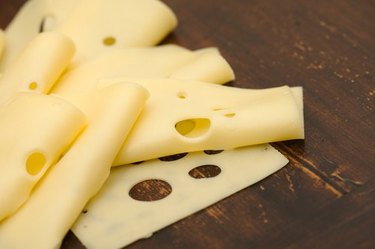
Healthy cheese may sound like an oxymoron, but the dairy boasts some health benefits that might surprise you. Cheese packs in healthy nutrients, many of which you may not get enough of — like calcium and vitamin B12. But this isn't a license to gorge.
Read more: 3 Reasons Why You Shouldn't Eat Too Much Cheese
Video of the Day
Video of the Day
The Academy of Nutrition and Dietetics suggests keeping a serving of cheese to 1.5 ounces, which is about the size of four dice. Most people don't need a reason to eat more cheese, but keeping your serving sizes in check and choosing a quality cheese is good way to get more nutrients in and nix those hankerings. Go for the 10 healthiest cheese types and brands we love below next time you're craving a creamy snack.
1. Cottage Cheese

Cottage cheese tops the list because of its high protein content. In fact, half a cup of low-fat cottage cheese contains 14 grams of the muscle-building macro.
And an August 2016 article published in Nutrients indicates cottage cheese has the highest casein-to-whey ratio of any cheese (casein and whey are the two proteins found in dairy products). Since casein is digested more slowly than whey, that's likely why cottage cheese showed the largest reduction in blood sugar levels. Cottage cheese can be enjoyed alone, with fruit or used in savory dishes like lasagna.
Brands we love: Good Culture Cottage Cheese and Organic Valley Organic 4% Milkfat Cottage Cheese
2. Quark
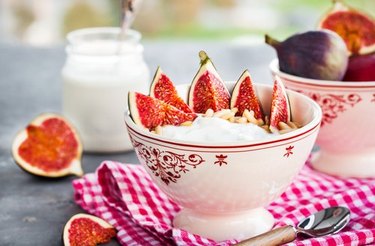
Quark may be something you've recently seen in the yogurt aisle, but it's actually a soft fermented cheese that's common in European countries. It's also known for its high protein and low lactose content. Quark is usually sold in six-ounce containers and has 17 grams of protein and 20 percent of your daily recommended amount of calcium.
The U.S. National Library of Medicine recommends quark as a low-lactose option for those with lactose intolerance. You can substitute quark for sour cream for a higher-protein alternative or serve it with fresh fruit.
A brand we love: Tnuva Quark Creamy Soft Cheese
3. Ricotta Cheese
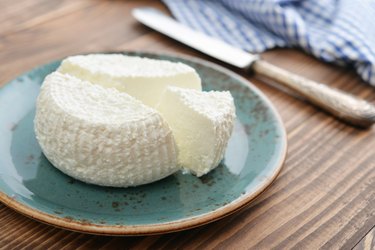
Ricotta cheese is a traditional Italian cheese that's sometimes called "whey cheese" because it's made of whey left over from the cheese-making process. It can be used in baking, as a spread on a baguette or served with fruit and honey.
Also popular in traditional Italian dishes like manicotti and lasagna, ricotta has one of the lowest sodium contents of any cheese, according to the University of California San Francisco. A 1.5-ounce serving of part-skim ricotta cheese contains only about 42 milligrams of sodium.
A brand we love: Organic Valley Organic Ricotta Cheese
4. Swiss
The next time you're choosing cheese for a sandwich, do your gut a favor and grab a slice of Swiss. Swiss cheese is one of the most popular fermented cheeses and has an unmistakable appearance. The fermentation process produces carbon dioxide, which causes the holes to form in Swiss cheese, according to a March 2015 article published in BioMed Research International.
Fermented cheeses like Swiss contain probiotic bacteria that are beneficial to our health. The bacteria in Swiss is even linked to protecting against pathogens and reducing inflammation in the body, according to an August 2016 article published in Scientific Reports.
Brands we love: Applegate Natural Emmentaler Swiss Cheese Slices and Happy Belly Sliced Swiss Cheese
5. Goat Cheese

As the name implies, goat cheese, or chevre, is made from goat's milk and is a tangy cheese that's gained popularity due to its versatility in cooking. It's delicious as a simple spread, or you can use it as an ingredient in stuffed chicken breasts or in a healthy salad.
Goat cheese is often thought of as a healthier cheese because it has a slightly lower caloric content than cheese made from cow's milk. But it may also offer other benefits. Researchers found that those who ate a breakfast with goat's milk and cheese versus cow's milk and cheese were more satisfied after eating, according to an August 2017 study published in Nutrients. This was attributed in part to the higher amounts of medium-chain fatty acids it contains, which may help you eat less at your next meal.
Brands we love: Montchevré and Belle Chevre
6. Mozzarella

Mozzarella cheese comes in many forms, including fresh, shredded and part-skim. Known for its high calcium content, mozzarella contains 333 milligrams of calcium in a single 1.5-ounce serving, according to the National Institutes of Health (NIH). Calcium is important for building and maintaining strong bones.
The daily recommended amount of calcium is 1,000 milligrams for adults over 18 and 1,300 milligrams for children — and one serving of mozzarella cheese will give you 33 percent of your daily value of calcium. Mozzarella cheese is an obvious choice on a pizza, but try adding it to your pasta dishes or alongside fresh fruits and veggies for a daytime snack.
Brands we love: Happy Belly Shredded Mozzarella Cheese and Applegate Natural Mozzarella Cheese Slices.
7. Feta
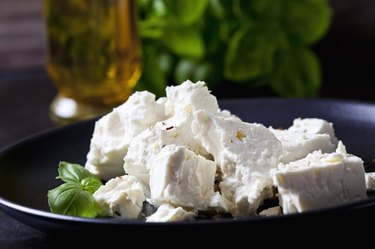
If you love a good Greek salad, chances are you love feta cheese. And because feta is considered a low-lactose cheese, feta may be one to try if you have GI issues yet still want to enjoy cheese. In fact, the University of Wisconsin Health recommends feta as a lower-lactose alternative to fresh or soft cheeses.
Feta is also a great choice if you're looking for a cheese that's lower in fat. A November 2016 review published in Food and Nutrition Research indicates that eating cheese, particularly lower-fat cheeses, may help reduce the risk of stroke and coronary heart disease. Keep servings sizes appropriate and add some feta to your next salad.
A brand we love: Mt Vikos Organic Feta Cheese
8. Parmigiano-Reggiano
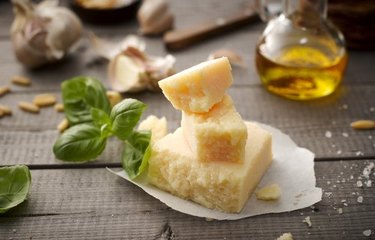
Parmigiano-Reggiano, often referred to as just Parmesan, is a treasure trove of nutrients. Parmesan is a functional food that promotes health is linked to reducing gastrointestinal symptoms and the risk of chronic diseases, according to an extensive September 2017 review article published in Food Technology & Biotechnology. The study also found that the calcium, vitamin D and certain milk peptides in the cheese may reduce blood pressure.
What's more, eating foods high in calcium is essential for preventing osteoporosis. To get more parm in your diet, shred it, shave it or slice it and toss on top of your favorite pasta dishes, stir into a risotto or add to a cheese platter with crackers and fruit.
A brand we love: Organic Valley Organic Grated Parmesan Cheese
9. Cheddar
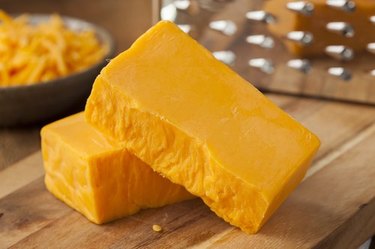
Cheddar cheese is widely available in the U.S. under a variety of flavors and colors. And if you're lactose intolerant, cheddar may be one type of cheese you can enjoy, according to the Cleveland Clinic, because it only contains between zero and two grams of lactose per serving.
Cheddar is considered an aged cheese, and as a cheese ages, it naturally contains less lactose. Cheddar also contains a good amount of calcium — 307 milligrams per serving, or 31 percent of your daily value, according to the NIH. This pick is versatile enough to be added to a sandwich, taco or baked potato.
A brand we love: Kerrygold Reserve Cheddar Slices
Read more: Your 10 Favorite Comfort Foods, Gone Light
10. Neufchâtel
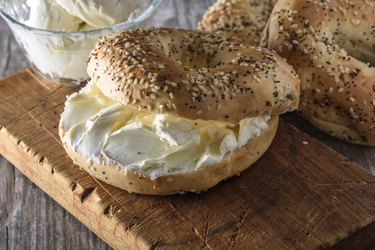
If you notice a type of cheese next to the cream cheese that dons a funny name, that just might be Neufchâtel. But it's not a cream cheese in disguise; it's a soft cheese with origins in France. With a taste and texture similar to cream cheese, it's listed as a lower-calorie substitute by the National Heart, Lung and Blood Institute.
In fact, Neufchâtel cheese has around 20 percent fewer calories and 30 percent less fat than traditional cream cheese. Try substituting Neufchâtel cheese for cream cheese in dips, sauces and spreads.
A brand we love: Organic Valley Organic Low-Fat Neufchâtel Cheese Spread
- Academy of Nutrition and Dietetics: "Serving Size vs Portion Size: Is There a Difference?"
- Nutrients: "Emerging Evidence for the Importance of Dietary Protein Source on Glucoregulatory Markers and Type 2 Diabetes: Different Effects of Dairy, Meat, Fish, Egg, and Plant Protein Foods"
- U.S. National Library of Medicine: "Shopping Tips for People with Lactose Intolerance"
- University of California San Francisco: "Guidelines for a Low Sodium Diet"
- USDA: "Part Skim Ricotta Cheese"
- BioMed Research International: "Impact on Human Health of Microorganisms Present in Fermented Dairy Products: An Overview"
- Scientific Reports: "Dairy Propionibacterium Extends the Mean Lifespan of Caenorhabditis Elegans via Activation of the Innate Immune System"
- University of Wisconsin Health: "Lactose Intolerance"
- Food and Nutrition Research: "Milk and Dairy Products: Good or Bad for Human Health? An Assessment of the Totality of Scientific Evidence"
- National Institutes of Health: "Calcium"
- The Cleveland Clinic: "Lactose Intolerance"
- Food Technology and Biotechnology: "Cheese as Functional Food: The Example of Parmigiano Reggiano and Grana Padano"
- National Heart Lung and Blood Institute: "Low-Calorie, Lower Fat Alternative Foods"
- Nutrients: "Comparison of the Effects of Goat Dairy and Cow Dairy Based Breakfasts on Satiety, Appetite Hormones, and Metabolic Profile"
